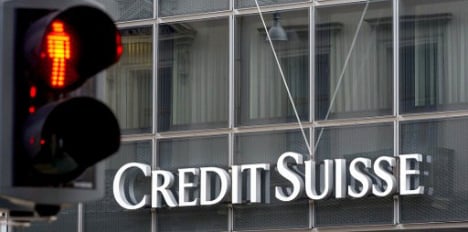Credit Suisse CEO Brady Dougan expressed regret about the bank's conduct in testimony before a US Senate panel that led a years-long investigation of "Swiss bank secrecy".
"Credit Suisse acknowledges that misconduct, centered on a small group of Swiss-based private bankers, previously occurred at our bank," the bank said in a statement submitted at the hearing.
A Senate inquiry found that the bank, Switzerland's second largest, used elaborate measures to help thousands of wealthy US clients evade billions of dollars in taxes.
"Credit Suisse's management team regrets very deeply that despite the industry-leading compliance measures we put in place, we have some Swiss-based private bankers who appear to have violated US law," said Dougan, the first American to lead a major Swiss bank.
"While I am extremely dismayed by the conduct, Mr Chairman, I also believe that leadership… is facing up to the past, and taking responsibility for what our employees do."
An internal probe "found no evidence that Credit Suisse's executive management was aware of these problems," the bank said.
The Senate report, based on a two-year investigation, maintained that Credit Suisse had "nearly 19,000 US customers with hidden Swiss assets totalling nearly $5 billion" as of 2006.
That figure represents some 85 percent of the bank's more than 22,000 US customers in 2006 with Swiss accounts whose assets, at their highest, exceeded $13.5 billion, the report said.
That amount is more than "twice as much as what was said so far", Douglas Hornung, a Swiss business lawyer specialized in the banking sector, told AFP, speculating that Credit Suisse could face a US fine of around $2.0 billion for its misdeeds.
The final amount will likely not be known for months, but it will probably tower above the $196-million fine Credit Suisse was slapped with last week by US regulators for providing unregistered brokerage and investment advisory services to US clients, he said.
Secret wooing of clients
Senator Carl Levin, chairman of the subcommittee that led the investigation, took Credit Suisse to task for failing to live up to promises of transparency after a similar 2008 investigation.
"It's five years later, and the sad truth is that the era of bank secrecy is not over," Levin said.
"And we have great concern that the battle to collect those unpaid taxes on hidden offshore assets seems stalled."
Levin demanded that the bankers "turn over the names of the people you aided and abetted in tax evasion", noting that so far they had given only 238 names.
Among the bank's cloak-and-dagger practices revealed in the Senate report, several Swiss bankers were sent to the United States to secretly find new clients, leaving no paper trail, at events like golf tournaments sponsored by the bank.
Levin said former Credit Suisse clients were taken to meetings in Zurich on remote-controlled buttonless elevators, received bank statements hidden inside magazines, and were issued secret US credit cards allowing them to draw on their Swiss accounts.
Dougan, 55, testified alongside Hans-Ulrich Meister, who heads Credit Suisse's private banking division; Robert Shafir, in charge of the bank's US business; and chief council Romeo Cerutti.
Meister said his bank shared "absolutely the same goal" as US authorities in ending the secretive accounts.
But Levin countered that the banks continued to hide behind Swiss secrecy laws when operating in the United States.
"That's just not going to cut it," he said.
From 2008 to 2011, after a tax evasion scandal broke at Swiss bank UBS, Credit Suisse began phasing out its evasive practices, asking clients to close their accounts or declare them.
By the end of 2013 the number of Swiss accounts held by US clients at Credit Suisse fell by 85 percent, the report said.
Swiss President Didier Burkhalter played down the harsh tone of the hearings.
"We must not overestimate the impact of these hearings," Burkhalter told public broadcaster RTS during a visit to Washington.
He also pointed out that the US Senate had yet to ratify a double-taxation deal considered "essential for the collaboration" on tax issues between the two countries.
Credit Suisse is only one of 14 Swiss banks under US investigation for allegedly accepting tens of billions of undeclared dollars from US citizens.



 Please whitelist us to continue reading.
Please whitelist us to continue reading.
Member comments